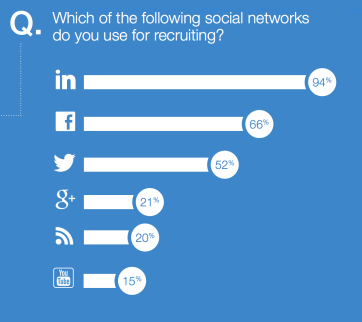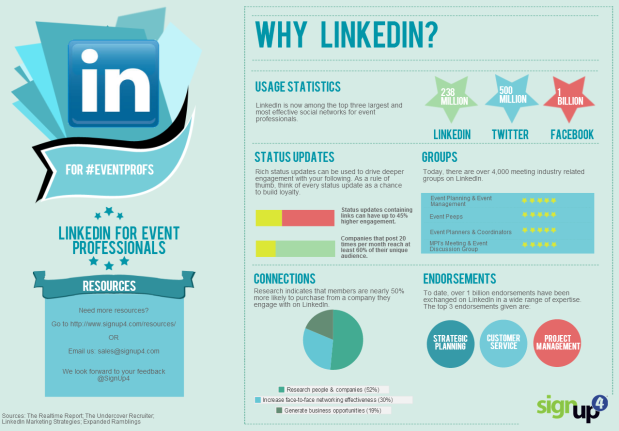On the surface these two seem completely disconnected, but think of it this way – you have around 10 seconds to impress a recruiter, no longer than the max snapchat (Nyman, 2014). This appears to be a problem with professional profiles in the internet age, the ease of finding applicants and as such, the difficulty of standing out. So how do we as the “net generation” (Tapscott, 2014), get noticed?

Figure 1 – JobVite Social Recruiting Report, 2014
The answer lies in how we build our professional profile. The idea of companies using social media as a form of recruitment stems from an initiative of influencing both applicants to get to know them and visa versa, aiming towards a more personal relationship. Fig 1. (Jobvite, 2014) shows the top platforms from a recruiters perspective, interestingly I was surprised that Facebook came in second as I would always associate that with my personal rather than professional life.
TIP 1: It’s true that a rule should be always keep your personal life private, but that doesn’t mean you can’t still use platforms for professional use. However cases Ronson presents like Justine Sacco, Lindsey Stone and Alicia Ann Lynch (2015), of how their naive tweets became viral and cost them their jobs, just how careful we should be when posting content, no matter how harmless we believe it to be.
TIP 2: Look Sharp blogger, Nathan, suggests that the best way to create an authentic profile is by focusing on your “elevator pitch” (Parcells, 2014). Imagine you get into an lift (because we’re not American) and by chance the CEO of your dream company gets in too, you have 30 seconds to sell yourself….GO! It’s quite difficult right? Well this is what should form your about me section.

Figure 2: The Meeting Pool, 2016
TIP 3: Research revealed recruiters look for 3 main things – what you are currently doing, your key skills and your professional interests (Donnelly, 2014). All of which are easily found on a professional profile – if you do it right. Fig. 2 shows how LinkedIn has become the 3rd largest social network in the world, so how you present your professional profile really is key to success. One of the key ways you can authenticate yourself online is by unifying your presence on channels (ASC, n.d.), primarily this can be done by constantly updating your profiles at the same time so that whatever way a recruiter finds you, they’ll always be presented with the same content.
Word count: 402
Reference List:
ASC. (n.d.). Building Your Professional Online Presence. Ohio State University. Accessed 10 March 2017.
Donnelly, D. (2014). Building your professional online profile. Inspiring Interns [Online]. Accessed 9 March 2017.
JobVite. (2014). Social Recruiting Survey. Accessed 10 March 2017.
Parcells, N. (2014). How to Create a Killer Online Professional Profile. Looksharp [Online]. Accessed 9 March 2017.
Nyman, N. (2014). Using Social Media in your Job Search. Web Science MOOC via Harris, L. [Online]. Accessed 10 March 2017.
Ronson, J. (2015). How One Stupid Tweet Blew Up Justine Sacco’s Life. New York Times [Online]. Accessed 9 March 2017.
Tapscott, D. (2014). Five Ways Talent Management Must Change. WeForum [Online]. Accessed 10 March 2017.

Hi Rachel, I really enjoyed reading your blog post, thank you! The finer details you provided about what employers look for and how to make effective use of a LinkedIn profile (e.g. Figure 2) were particularly interesting. In light of the increased use of social media by employers, in cases such as this, do you believe that some people feel pressured into using deceit to sell themselves on various platforms? In other words, with increasing global job market competition, and the increased flexibility associated with online profiles, do you feel as though its now become easier for us to lie and dupe employers. Or, despite the methodological issues of measuring deception, do you agree with Guillory and Hancock (2012), in that increased publicity means we are more likely to think twice before claiming falsehoods through fear that members of our network will notice?
Thanks
Brad
LikeLiked by 1 person
Hi Brad, thanks for your comments and feedback! I think thats definitely the case for some people, as I guess you want to present the best version of yourself – I wonder if this is just the modern day version of lying on your CV? I think it may be easier to lie, but with so much information online I think it is also easier for employers to find out what the truth is. Really interesting when you think about it though! I guess you either are completely yourself and run the risk of not standing out to employers, or you exaggerate yourself online to suit an employers job and risk being found out – rock and a hard place almost! Thanks, Rachel
LikeLike
Rachel, I suppose you’re right… just a simple transfer of old tricks onto new platforms (LinkedIn) perhaps? I suppose it depends how far you are willing to go, in order to narrate a particular story for yourself. And whether you can trace and alter every aspect of your online identity. Given the amount of profiles I have on various platforms, it would probably be impossible for me to alter these identities and lie!
Brad
LikeLike
Hey Rachel,
Firstly, I would like to compliment your creative post title. It was the initial reason of why I chose to read your blog post. In addition to this, your visual elements supported your arguments throughout your presentation which strengthened your overall structure. I particularly enjoyed the section of the “elevator pitch”. It got me thinking on how I would present myself in such a short time frame.
On a different note, you mentioned in your first tip that people are capable of maintaining a private and a professional account. But then you named examples of cases such as the Justine Saccos case where her tweet led to her losing her job. So where exactly do you stand? Should you keep certain accounts on lock down, such as Facebook? But then again aren’t the people closest to you more willing to help you reach your goals? It would be more difficult to achieve this if you split your audiences.
I would love to hear about your thoughts.
Keep up the good work,
Sharon
LikeLiked by 1 person
Hi Sharon, thanks for your feedback! The Snapchat link is something that really surprised me – I’ve never thought of how quickly I had to impress someone before! For me personally I used Saccos as an example of how easily something meant to be harmless can be twisted and taken out of context. I think with Facebook it is less public so that is one I’d use for more personal reasons I think – it is difficult to find a balance though. What do you think?
Thanks, Rachel
LikeLiked by 1 person
I agree with you Rachel ! I believe you could easily write an entire research project on this topic. I guess the privacy settings on Facebook are user friendly and allow us to lock down our profile if we wish to do so. On a different note I have found a small article on how journalists negotiate/balance their personal and professional identities on social media. There are three main ways, in case you are interested. It has a very short summary :http://www.tandfonline.com/doi/abs/10.1080/17512786.2016.1175314
Thanks again for a great read
Sharon
LikeLike
Hi Rachel
Thanks for the post, it was a great read! I like how you’ve linked job searching to Snapchat, a platform not commonly associated.
I too was surprised to find Facebook as the second most popular social network for recruiting (https://www.jobvite.com/wp-content/uploads/2014/10/Jobvite_SocialRecruiting_Survey2014.pdf). You mention that we should always keep our personal lives private but do you think employers also want some indication of our social interests? If so, how do we go about presenting this professionally?
In the Jobvite graphic you included, it was noted that 15% of employers used YouTube to recruit. Admittedly these statistics may be misleading as recruiters may have only looked at YouTube for specific roles such as digital media consultants. Having said that, for many, YouTube isn’t used as a professional platform so do we need to change our behaviour to account for this?
Thanks
Callum
LikeLiked by 1 person
Hi Callum! Thanks for your feedback! I think that’s such a difficult one and perhaps employers attention to our social interests is the reason why they look at our other social media platforms – that’s why I always keep in mind who can see my public profiles when posting things! In regards to YouTube it’s interesting you mention that as I have looked at a couple job adverts which require you to post a video on that platform giving almost like a mini presentation – something I’d never have thought to use YouTube for before! So quite possibly we need to change our attitudes and realise how many different social media platforms can be utilised for our professional profiles! What’s your take on this?
Thanks, Rachel.
LikeLiked by 1 person
Hi Rachel
I agree with you on this. In a discussion with Ji on my post I emphasised how important it is to stay professional even in ‘social’ contexts online. I think some people over estimate how protective privacy controls actually are. The loophole mentioned around accessing private Facebook profiles here is just one example why we need to stay professional online https://www.repnup.com/blog/2015/09/09/employers-can-find-your-facebook-profile-set-to-private/
Your comment about YouTube is really interesting, I haven’t seen anything like that before. What sort of roles were they? It definitely highlights the changing nature of recruitment in the digital age.
Considering this, I do think we may need to change our attitudes in some respect but I feel it’s important not to present an overly ‘clean’ profile that doesn’t truly reflect your personality. Though we need to be careful with what we post of course.
Thanks,
Callum
LikeLiked by 1 person
Hi Rachel,
I found your post very interesting to read. I especially liked the structure you used of providing clear tips as advice on how to make the most of social media for recruitment.
You spoke about the importance of coordinating your social networks by presenting possible recruiters with the same content on each platform. I usually use my social networks such as Instagram and Snapchat all separately and present different types of content on each because I feel that they all have different purposes for use. For example, I wouldn’t post selfies with my friends on LinkedIn but I would on Instagram.
I found this post on some of the purposes and unique points of social networking sites:
http://www.verticalresponse.com/blog/social-media-your-business-choosing-the-best-platform/
In your opinion, do we have to be consistent on all fronts with our social media or should we tailor what we post on each platform to suit its purpose?
(150)
LikeLiked by 1 person
Hi! Thanks so much for your feedback, I’ll have a look at that webpage! To a certain extent I think we have to be consistent, for example my Instagram and LinkedIn are clearly both extensions of my online identity but I use them for different purposes. However I think I should always be aware that employees can be both – so in that way they’re consistent. I hope that makes sense!
LikeLiked by 1 person